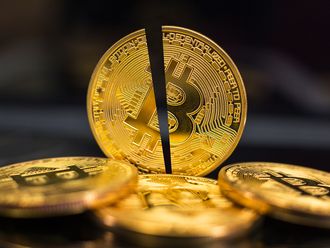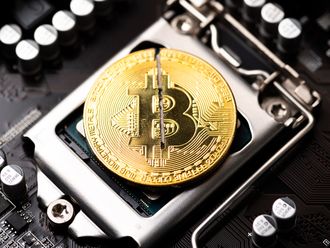Dubai
Regulators, central banks and governments world over are struggling to fit in Bitcoin, which is the newly-found fascination among finance experts, in the current framework of rules and legislations.
The certain definition of Bitcoin, which is dematerialised and decentralised electronic money that many say could possibly challenge the existing fiat currency system, will help governments to regulate it, or even get them under the tax bracket even as many crypto exchanges have been tangled into lawsuits either on charge of hacking or even insider trading.
Khurram Shroff, chairman of International Blockchain Capital Group feels that its structure depends on which part of the world you are in, in the United States bitcoin is a commodity, while in Europe, it is a currency.
The US Securities and Exchange Commission and the US Commodities Futures Trading Commission said in a report that “virtual tokens may be commodities or derivatives contracts depending on the particular facts and circumstances.”
Given the wild fluctuations in daily value of bitcoin it would be difficult for the cryptocurrency to be called a currency, according to Konstantinos Anthis, Head of Market Research at ADS Securities.
“Calling it a commodity is a logical approach as coins do not behave like currencies. To fulfil its role a currency needs to be relatively stable and reflect an underlying value in a country or economy. As soon as a currency fluctuates widely it has effectively failed and will lead to investors moving into a more stable asset,” Anthis said in an email to Gulf News.
Regulations
If 2017 was remembered as the year, when Bitcoin and cryptocurrencies came from the shadows and became an investment option to all mom and pop investors, then 2018 will be remembered as the year when governments started to actively think about regulations.
South Korea banned a few cryptocurrency exchanges, after China’s tough action in blocking virtual coin platforms. US Federal Reserve, Bank of England along with European Central Bank were at the forefront in asking to get cryptocurrencies under regulatory ambit.
In a blog, Christine Lagarde, the head of International Monetary Fund said: “We can begin by focusing on policies that ensure financial integrity and protect consumers in the crypto world just as we have for the traditional financial sector. Indeed, the same innovations that power crypto-assets can also help us regulate them. To put it another way, we can fight fire with fire.”
And it is due to the threat of regulation, Bitcoin prices have been subdued after stellar gains in 2017, when prices hit a record high of near $20,000 level.
“We need regulation to monitor and manage cryptos’ volatility. Until we have regulation in place, market manipulation could be a major potential issue. Globally, regulators are designing frameworks to regulate the industry and this will be positive,” Tariq Bin Hendi, acting chief investment officer at Emirates NBD told Gulf News over the phone.










_resources1_16a30b358e0_small.jpg)

